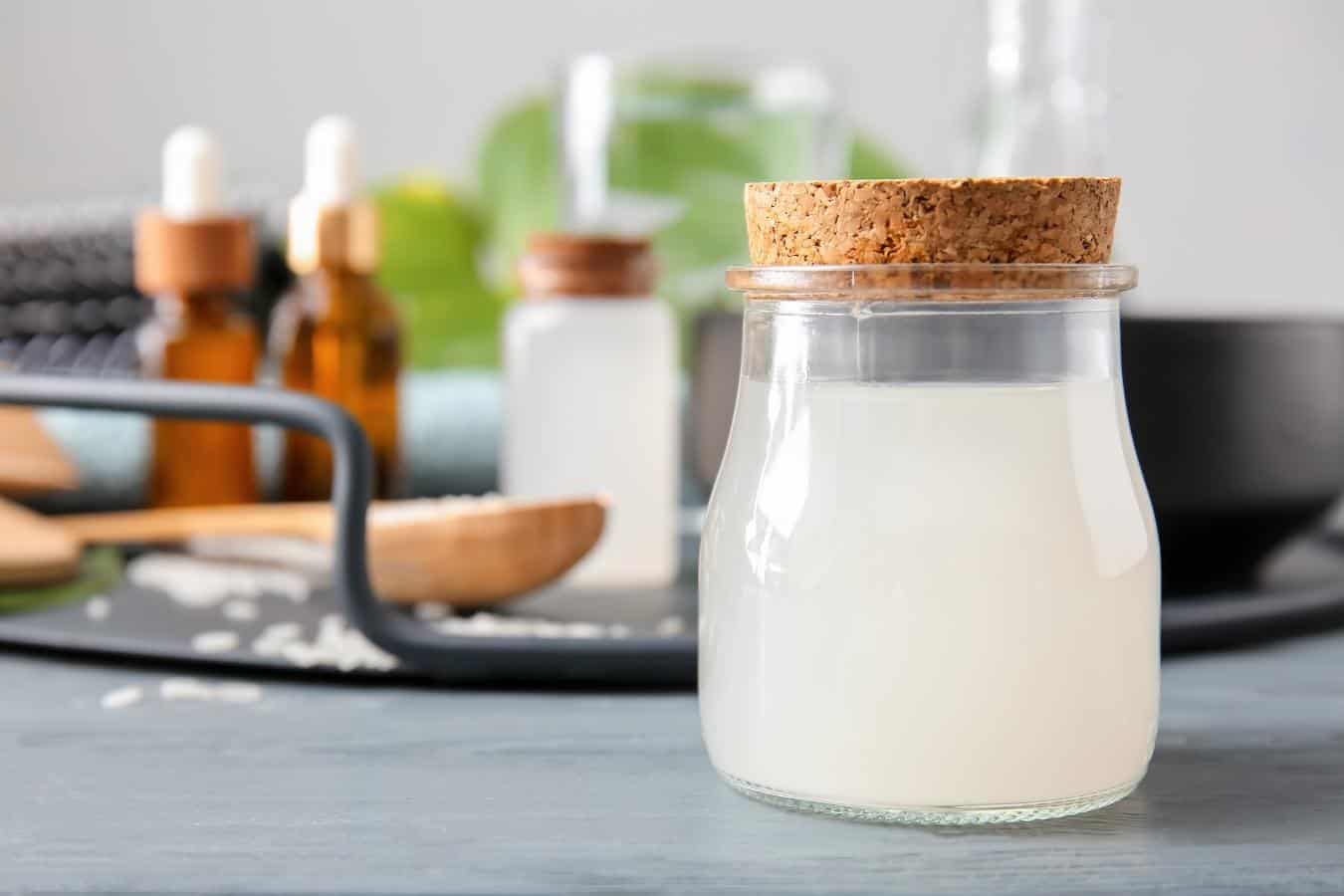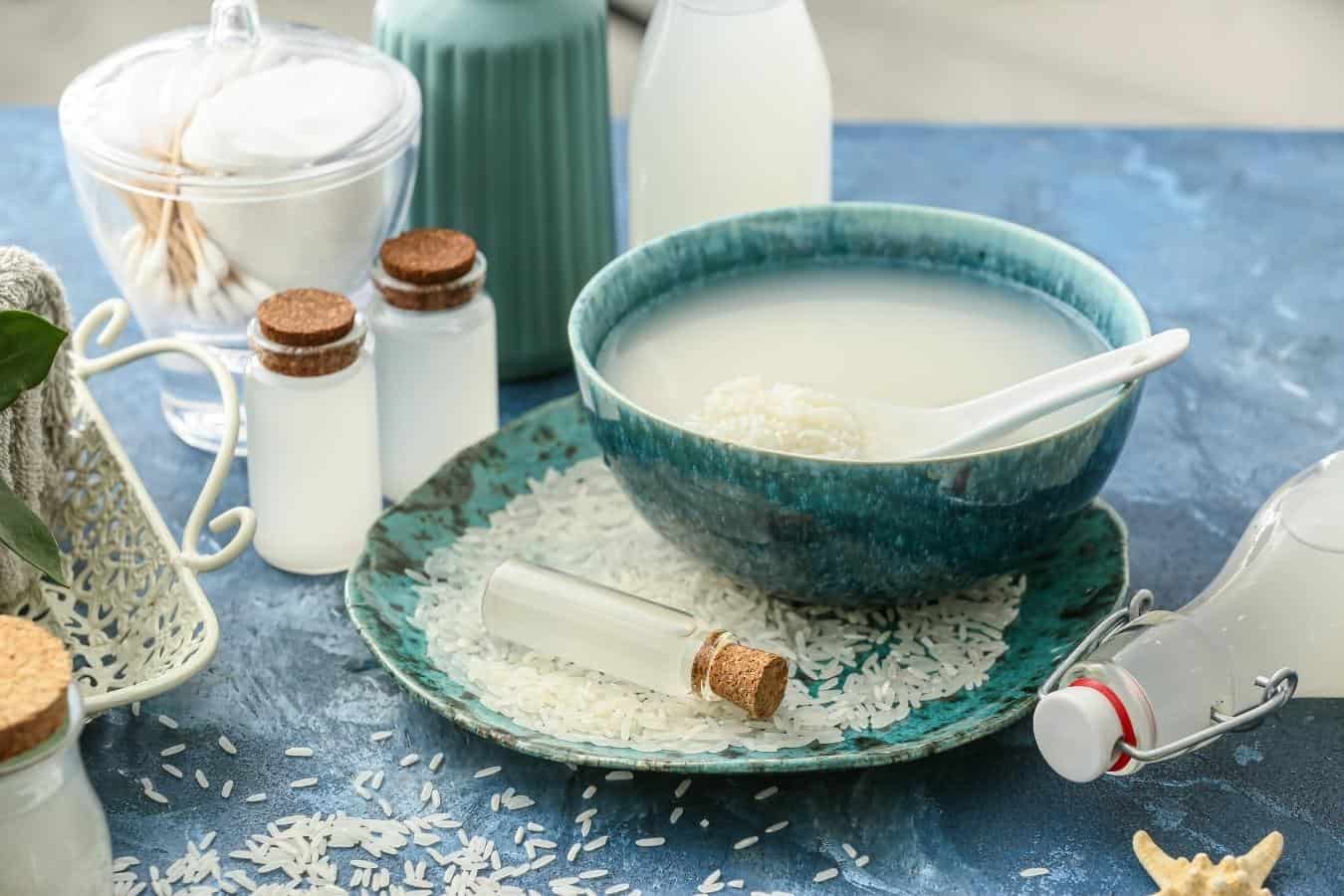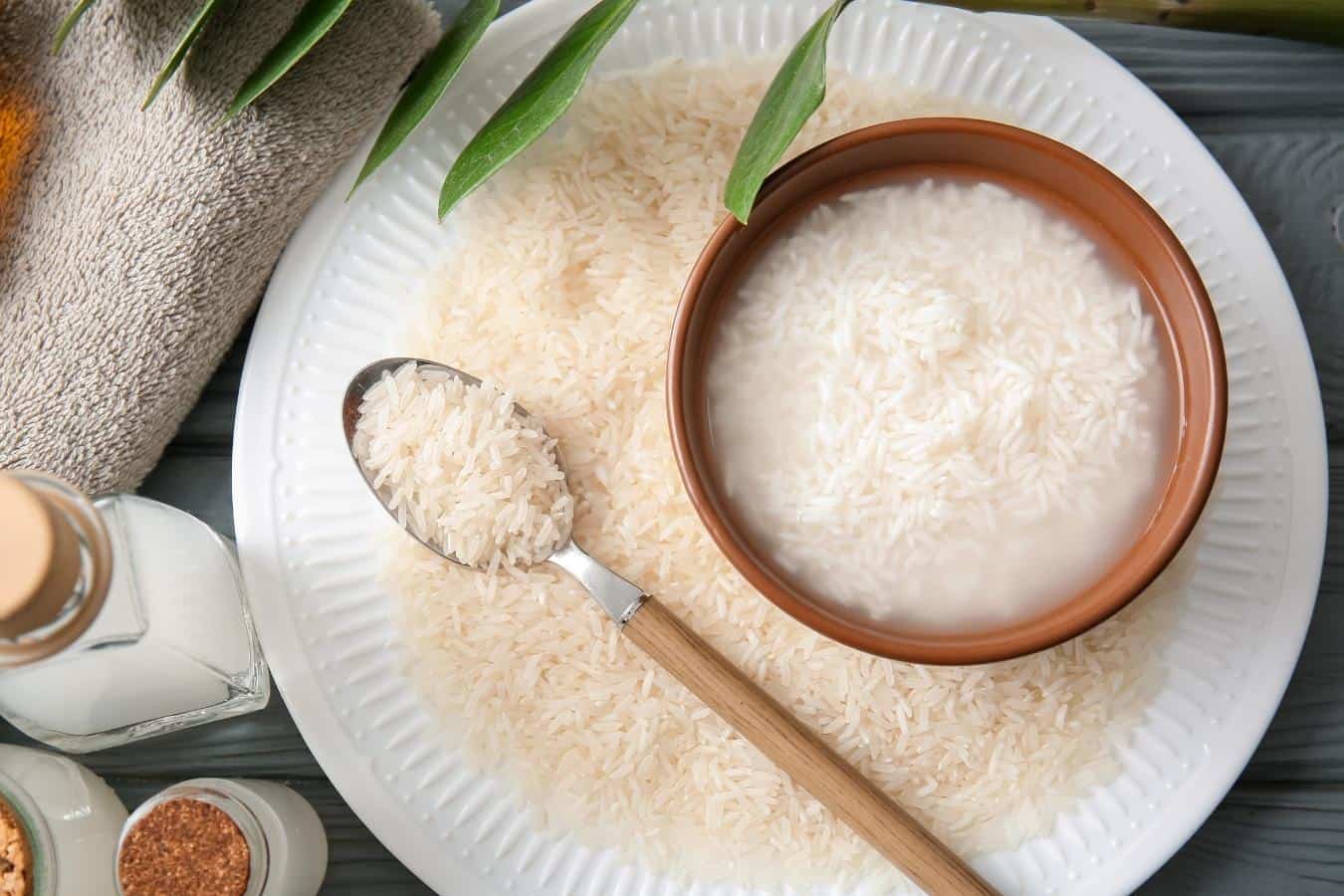Rice water has been used as a hair treatment for hundreds of years. While some of its benefits are anecdotal, others are backed by science. However, using rice water on your hair could potentially lead to side effects.

Some side effects of rice water on hair include a dry scalp and an unpleasant odor. Using rice water excessively could also leave you with a protein build-up. Rice water is more likely to damage hair with low porosity or hair that is fine and thin.
What Is Rice Water?
Rice water is the liquid that’s created when you allow the rice to soak in water.
This liquid is high in starch and contains the same ingredients that you can find in rice. In Ancient Asia, many women used rice water to keep their hair long and healthy.
You can easily make rice water at home by using either cooked or uncooked rice. You can create rice water by soaking, boiling, or fermenting rice.
Once the water has been created, you simply need to strain out the rice and transfer the rice water to a clean container.
You can use rice water on your hair immediately or store it in the refrigerator for up to five days.
Usually, rice water is massaged into wet hair and left there for 10 to 20 minutes.
Afterwards, the substance is rinsed out with warm water. Rice water can be used on freshly cleansed hair or before a shampoo.
Why Use Rice Water On Hair?
Rice water contains a powerful ingredient called inositol that is capable of penetrating the hair shaft and repairing damaged hair. (1)
Thanks to this ingredient, rice water can strengthen hair and improve its ability to retain moisture.
Rinsing your hair with rice water can also improve your hair’s elasticity, helping to prevent future damage. (2)
If you have hair that is prone to breakage, using rice water could potentially prevent hair loss.
While there are long-term benefits associated with using rice water on your hair, you can also see immediate effects after a rice water rinse.
Since rice water coats your hair, it can add shine and leave hair looking smoother than usual.
Not only can rice water benefit hair but it’s been linked to skin benefits as well. It’s common for people to use the rice water they create on both their skin and their hair.
When you make rice water, you have a 2-in-1 beauty treatment that has the potential to give you amazing results.
7 Side Effects Of Rice Water On Hair

Rice water offers all kinds of appealing benefits, but using it on your hair does have side effects.
These are seven of the side effects that you’ll want to watch out for when applying rice water to your hair:
1. It Can Make Hair Dry
While the proteins in rice water can help nourish hair, they can also cause a protein build-up.
The protein molecules of the rice water can coat the surface of your hair, leaving it feeling dry and stiff.
This coating can protect your hair from damage, but it could also keep your hair from receiving the moisture that it needs.
It’s best not to use rice water on your hair before you condition it.
2. It Could Give You a Scalp Yeast Infection
Everyone has a small amount of yeast on their skin and scalp. However, rice water has the potential to make this problem much worse.
Rice water is high in starch, and yeast can feed off of the sugar found in starch.
A rice water rinse could increase the amount of yeast your scalp produces, which has the potential to cause a scalp yeast infection.
Even if you’re able to avoid a yeast infection, it could leave your scalp feeling dry or irritated.
3. It Can Leave Behind an Odour
The smell of rice water can be pungent. Even though you’ll be rinsing the rice water out of your hair, the scent could potentially linger.
This can be a problem, especially if you have a sensitive nose.
Long-term exposure to a scent can make it more difficult to detect that smell.
Because of this, your hair could have a noticeable odor that you’re not aware of. You may not want to risk rinsing your hair with rice water before important events.
4. It Can Damage Low Porosity Hair
If you have low porosity hair, you’re much more likely to experience negative side effects when using rice water.
It’s already difficult for water to penetrate the hair shaft when hair has low porosity, and rice water could make the problem worse.
Using rice water on low porosity hair could leave you with hair that’s dry, frizzy, and brittle.
While rice water usually improves the appearance of hair, it has the potential to make some hair types look worse.
5. It Can Cause Flaking
Since rice water can make the scalp dry, it could cause the scalp to flake. If you already struggle with dandruff, using rice water could make the problem worse.
In addition to creating flakes, it could leave you with an itchy scalp.
If you use rice water on your hair regularly, it could eventually help to balance oil production on your scalp, which could reduce dryness.
You’ll have to decide if you’re willing to deal with flakes to improve the overall health of your hair.
6. It Can Contain Toxic Ingredients
Even though rice water is natural, it can potentially be a source of toxic ingredients. Rice contains arsenic, and when you soak rice in water, some of that arsenic will wind up in the rice water.
While the arsenic levels of rice aren’t dangerous, you’ll still be applying a poisonous ingredient to your hair.
7. Results Can Vary
Even if you’ve seen someone else get great results by using rice water on their hair, you shouldn’t expect that it will affect your hair in the same way.
The results you’ll get from rice water can vary significantly based on your type. It tends to work well on straight hair, but can cause problems on hair that is textured or curly.
Not only can it be hard to predict results, but it takes time for rice water to have a lasting impact on your hair.
While a rice water rinse can immediately add shine, you’ll have to use it on a long-term basis in order to see any significant changes to the health and condition of your hair.
How To Avoid The Side Effects Of Using Rice Water

Even though rice water has a number of side effects, most of these side effects are completely preventable.
If you’re cautious when using rice water, you can avoid issues while still enjoying the benefits it provides to hair:
Use Rice Water on a Limited Basis
Rice water is best used in moderation. If you use it too frequently, you’re more likely to experience protein build-up, which can create many problems for your hair.
It can be tempting to use rice water on your hair all the time, especially if you love the results it gives you.
However, you’ll get better results in the long run if you limit your usage of rice water.
Depending on your hair type, you may want to limit yourself to using it once per week or even once a month.
Rinse and Cleanse Your Hair After Use
You need to make sure that you’re completely removing the rice water from your hair after a rinse.
If any rice water is left behind, it’s more likely that you’ll have to deal with odors later on.
It’s best to cleanse your hair after a rinse so that you can be sure that the product has been fully removed from your hair.
Try to use a gentle shampoo to avoid stripping your hair of moisture.
Test Your Hair Porosity
If you know how porous your hair is, you’ll have a better sense of how you should use rice water.
People with low porosity hair can still use rice water, but they shouldn’t use it very often.
The quickest way to check the porosity of your hair is to drop a hair strand in a glass of room temperature water.
High porosity hair will sink quickly, while hair with normal porosity levels will sink slowly. If you have low porosity hair, the strand will float on top of the glass instead of sinking.
Only Apply Rice Water to the Ends of Your Hair
If you’re concerned about dandruff or have struggled with a dry scalp, it’s best not to apply rice water to your scalp. Instead, you should apply it to the ends of your hair.
Even if you only apply rice water to the ends of your hair, it can add shine and protect your hair from damage.
Before a rice water treatment, you should assess the condition of your scalp and decide how you want to proceed.
Stick to White Rice
Brown rice is packed with nutrients, but it may not be the best option for a rice water rinse. It contains significantly more arsenic than white rice does.
On top of that, each grain of rice has a hard outer layer that can make it difficult for nutrients to make their way into the water while rice is soaked.
There’s nothing wrong with eating brown rice, but when you’re making rice water, white rice is the best option.
You can get great results from both short and long-grain rice.
Try Using Fermented Rice Water
If you’re not getting great results from rice water, you may want to try using fermented rice water instead.
While fermented rice water is more likely to have a pungent smell, it also contains more antioxidants.
To create fermented rice water, allow the rice to soak in a bowl of room temperature water for up to two days.
Once the water has had the chance to ferment, you can strain out the rice and transfer the water to a clean container.
Frequently Asked Questions
While rice water usually isn’t damaging to the skin, it can cause dryness or irritation if it’s used too frequently. Sensitive skin could also react to rice water, which is why it’s best to do a patch test before use.
Rice water is packed with nutrients, including vitamins A, C, and E. By providing hair with these essential vitamins and minerals, you can strengthen hair follicles, which could potentially encourage hair growth.
It’s best to use rice water on your hair 1-3 times a week. If you apply it to your hair on a daily basis, you’re more likely to experience side effects.
Rice water coats your hair with protein, which can help give the illusion of thicker hair. It can reduce hair fall and help to prevent breakage.
Sources
- https://pubmed.ncbi.nlm.nih.gov/12006122/
- https://onlinelibrary.wiley.com/doi/abs/10.1111/j.1468-2494.2010.00605_3.x
Disclaimer: This site is not intended to provide professional or medical advice. All of the content on LovedByCurls.com is for informational purposes only. All advice should be followed at your own discretion. Ingredients may change at any time so always check the product label before using. Check our full disclaimer policy here.
